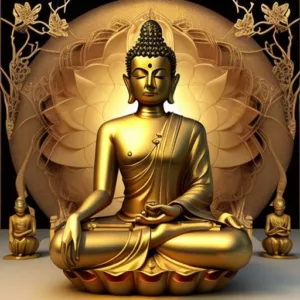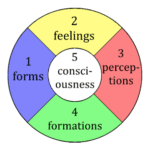Nourishing Mind, Body, and Spirit
Zen Buddhist Diet Plan and Restrictions

A typical Zen Buddhist diet plan emphasizes plant-based foods, whole grains, and seasonal vegetables. It avoids excess spices and strongly flavored foods to maintain simplicity and clarity of mind. Moreover, Zen Buddhists tend to avoid luxurious or extravagant meals.
Table of Contents
In Zen Buddhism, the path to enlightenment lies beyond the cushion and lands on the plate. The Zen Buddhist diet, an ancient tradition, is surprisingly used as a key element for awakening. Learn about the Zen Buddhist diet, principles, and the balance of life. We conclude with a short lesson on essential zen cooking principles. See Ōryōki – for the Zen eating style.
How to meditate like a yogi
and enter profound samadhi
Buddhist Fasting Rules: Mindful Eating
Buddhist fasting rules vary among different traditions. However, Zennies are known for mindful eating. Each meal enacts a sacred ritual, invoking gratitude and awareness, blending into every aspect of cooking and eating. An eating style called Oryoki has migrated into the Tibetan system through Trungpa Rinpoche.
Monks often eat only once a day. Here’s why:
- Spiritual Discipline: Eating once a day creates asceticism and self-discipline, helping monks detach desire, allowing greater focus for meditation.
- Simplicity: Single meals simplify daily life considerably. Monks naturally live a more straightforward existence.
- Alms Tradition: As per tradition from the Buddha, many monks rely on alms to eat. Limited eating places fewer demands on the local community.
- Health Benefits: Single meals have shown dramatic health benefits. The Buddha spoke of these, but science has recently verified them.
- Circadian Rhythms: Traditionally, monks eat only before noon. Digestion tends to be more efficient during the daytime. It also promotes good sleep.
- Mindful Eating: Oriyoki, or Zen monastic eating style, is an extremely mindful practice. Zen eating forms have a strong ability to induce mindfulness.
Buddhist Monk Eating Schedule
Buddhist monks follow a strict eating schedule, commonly known as the “alms round.” They rely on alms (donated food) from the community. Typically, they take only one or two meals a day, both before noon. The schedule cuts attachments to sensory pleasures and helps them to focus well.
Do Zen Buddhists Eat Meat?
It varies among individuals and communities as to whether Zen Buddhists eat various types of meat. Some of them choose a vegetarian or even vegan diet so as not to harm or kill animals. This follows the idea of ahimsa or non-harming. Not causing harm deliberately is essential to all Buddhist paths. However, Other Zen practitioners do consume meat, but only when it is offered as alms and in moderation.

Flow, the profound mental state, also called Peak Performance, can be attained with meditation and can be ‘triggered’ at will, with enough discipline. Guide to Flow Mastery will teach you how.
Zen Buddhist Recipes and Shojin Ryori Cookbook
For those interested in exploring Zen Buddhist cuisine, the Shojin Ryori is an awesome one. Shojin Ryori is the traditional vegetarian cuisine of Zen Buddhist monks in Japan. The theme is simplicity, balance, and seasonal ingredients. You can find a wide range of Zen Buddhist recipes in this cookbook to help you create nourishing and spiritually uplifting meals. One curious principle is to always include the five flavors: bitter, sour, salty, sweet, and umami.
Zen 5 tastes cooking
A little known Zen cooking technique is to add at least some of every taste in every dish.
| FLAVOR | COMMENTS | EXAMPLE FOODS |
|---|---|---|
| Sweet | Craved, addictive, quick energy. Sparingly. | Sugar, fruit, beets, and syrups |
| Salty | Cuts opens tastebuds to increase flavor. Strengthens bonds in bread dough. Necessary for life (small quantities). | Himalayan salt, sea salt, miso, and soy sauce |
| Sour | Acidity. Helps bland foods. | Lemon, rhubarb, fermented foods, soudough bread, yogurt, vinegar |
| Bitter | Can improve nutrient uptake, bowel health, and general digestion. small quantities create dramatic complexity in foods. | Coffee, grapefruit, cocoa, cranberries, bitter melon |
| Umami / savory | Glutamates, amino acids and nucleotides. | Nutritional yeast, soy / miso, seawood, various mushrooms, celery. |
Conclusion: Japanese Zen Cooking
The Zen Buddhist diet reflects from the broader philosophy of Zen Buddhism itself—simplicity, mindfulness, and a connection to the present moment. Whether you choose to follow Buddhist fasting rules, adopt a vegetarian lifestyle, or simply incorporate mindfulness into your meals, the Zen Buddhist diet can help anyone to relate to eating more simply.

May all beings be happy
May all beings be peaceful
May all beings be safe
May all beings awaken to the light of their true nature
May all beings be free








